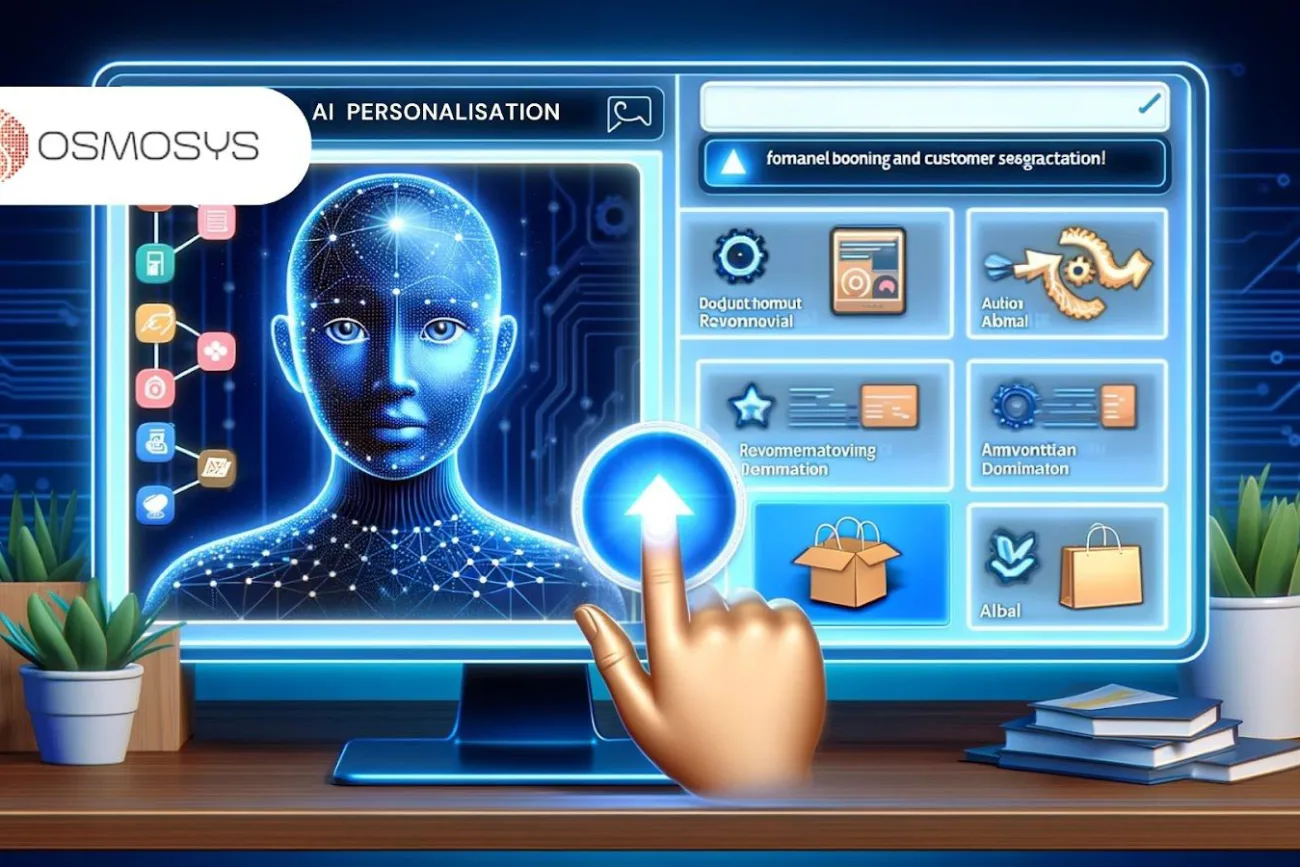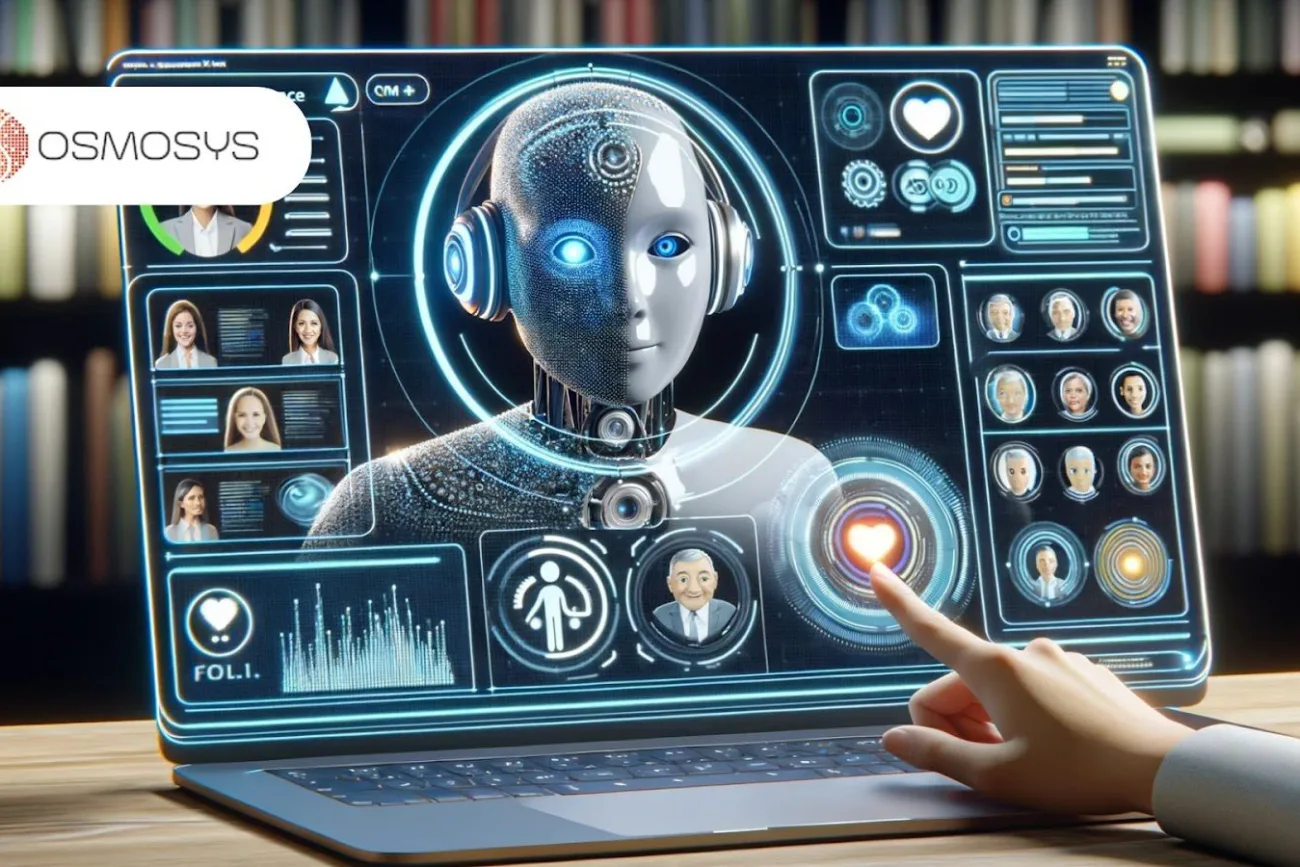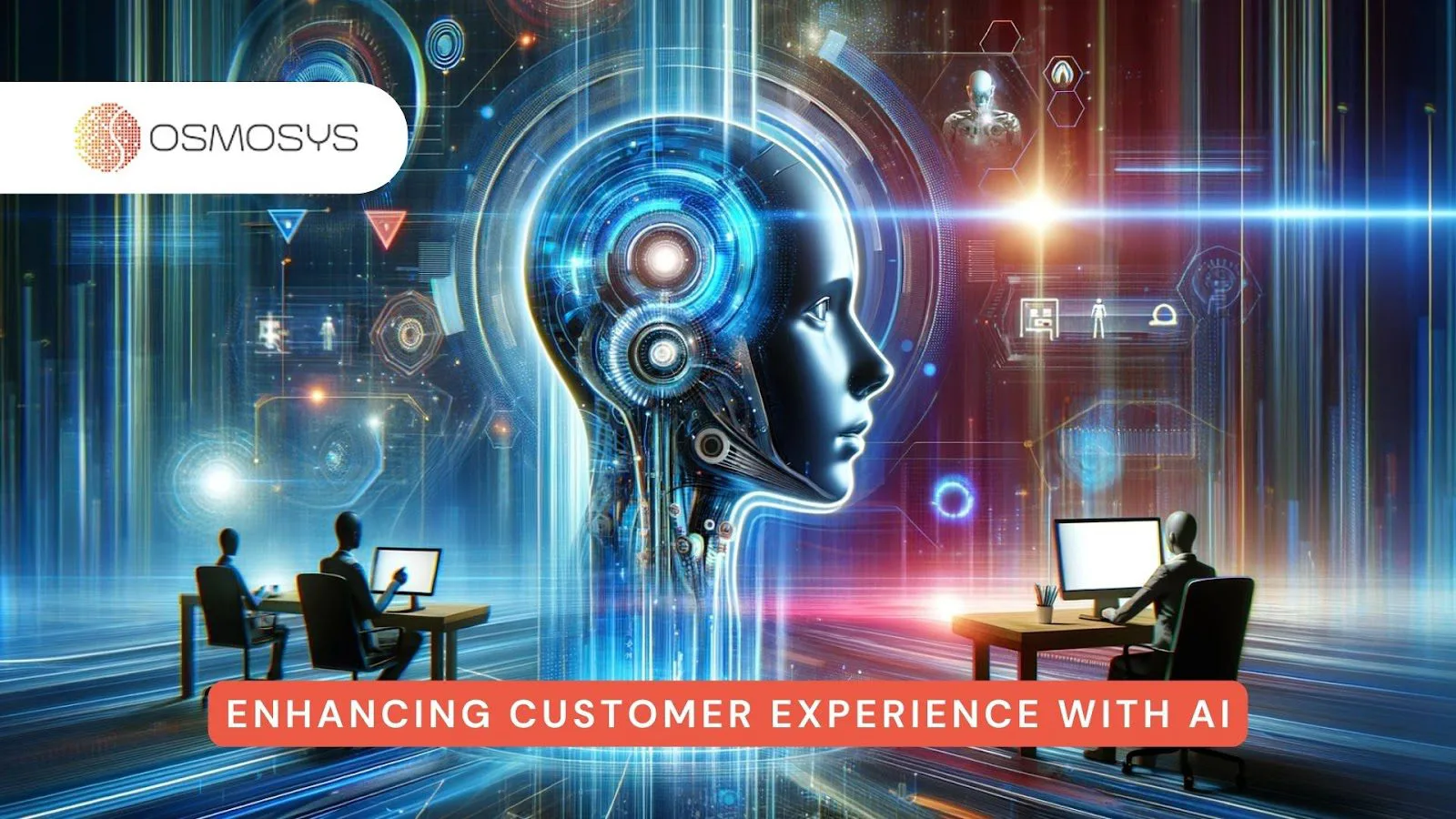Imagine a small cafe where every customer’s preference is remembered – from their favourite table to their usual order. This personalised attention is what made the cafe a community favourite.
Now, envision this level of hyper-personalisation, but on a larger, digital scale. This is what AI in CRM is achieving today. It’s transforming customer experiences from generic interactions into tailored engagements, mirroring that personal touch of the small cafe but amplified through technology.
This blog will explore how AI is revolutionising CRM, enhancing customer experiences from initial contact to long-term loyalty. We’ll look at how AI-driven CRM systems are not just tools for business efficiency, but catalysts for building deeper, more meaningful customer relationships.
Table of Contents
AI’s Role in CRM: A New Era of Enhanced Customer Engagement

The integration of Artificial Intelligence (AI) into Customer Relationship Management (CRM) systems is ushering in a new era of customer engagement, fundamentally transforming how businesses interact with their clients. This evolution is not just a technological advancement; it’s a strategic shift that is reshaping the entire business landscape.
- Enhancing After-Call Efficiency: AI in CRM is redefining customer service by streamlining post-call processes. Tools like Microsoft Dynamics 365 Copilot automate the transcription of call recordings, create concise summaries, and update CRM fields with relevant data. This technology significantly reduces manual effort, allowing agents to focus on more complex tasks, thus enhancing the customer experience.
- Predictive Customer Service and Personalisation: AI-driven predictive analytics within CRM systems analyse historical data and customer interactions to forecast future behaviours and preferences, leading to a highly personalised service experience. This approach enables businesses to proactively address concerns and tailor communications, fostering loyalty and driving long-term growth.
- Real-time Sentiment Analysis: AI also offers real-time sentiment analysis, interpreting the emotional tone behind customer communications. By analysing keywords and speech patterns, AI provides insights into the customer’s mood, allowing service representatives to tailor their approach and resolve issues proactively. This capability strengthens customer relationships and loyalty by building more empathetic connections.
- Lead Scoring and Sales Prioritisation: AI is transforming the sales pipeline through sophisticated lead scoring models. It analyses data points across customer interactions and social media activity to score leads, prioritising them based on their likelihood to convert. This data-driven approach ensures that sales efforts are focused effectively, enhancing both productivity and the customer experience.
The CRM market, expected to reach $145.8 billion by 2029, with AI as a key driver, reflects the urgency for businesses to adopt AI in their CRM strategies. Companies that leverage AI in CRM are not just surviving; they are thriving in a competitive marketplace, offering more meaningful, efficient, and profitable customer relationships.
Hyper-Personalisation: The Heart of AI-CRM

In the dynamic world of Customer Relationship Management (CRM), Artificial Intelligence (AI) is redefining the essence of personalisation. AI-driven CRM is not just about handling customer data efficiently; it’s about understanding each customer’s unique needs and preferences and tailoring experiences to match those individual requirements.
A significant example of AI’s role in CRM personalisation is its ability to offer customised product recommendations. By analysing a customer’s past interactions, purchase history, and even browsing behaviour, AI algorithms can predict what products or services a customer might be interested in next. This predictive capacity goes beyond mere guesswork, as it’s grounded in concrete data analysis, leading to higher conversion rates and enhanced customer satisfaction.
AI also plays a crucial role in segmenting customers for targeted marketing. It can sift through vast amounts of data to identify patterns and group customers with similar behaviours or preferences. This segmentation allows businesses to craft personalised messages and offers, increasing the relevance and effectiveness of their marketing campaigns.
Another aspect where AI excels is in real-time personalisation. AI-powered chatbots and virtual assistants can interact with customers, providing immediate, contextually relevant responses. This level of interaction ensures that customers feel heard and understood, significantly enhancing their experience.
Moreover, AI in CRM can track and analyse customer behaviour across various touchpoints, providing a holistic view of the customer journey. This comprehensive understanding enables businesses to fine-tune their strategies and interactions at every stage, ensuring a consistently personalised customer experience.
In short, personalisation is at the heart of AI-driven CRM. It transforms every customer interaction into an opportunity to deliver a bespoke experience, thereby not only meeting but often exceeding customer expectations. As AI technology continues to evolve, its role in personalising CRM will only become more profound, offering businesses endless possibilities to deepen customer relationships.
Predictive Analytics in Customer Service

Predictive analytics, a cornerstone of AI in CRM, is revolutionising customer service by anticipating customer needs before they even articulate them. This proactive approach is achieved by analysing patterns in historical data, customer interactions, and behaviours to forecast future needs, preferences, and potential issues.
One of the most compelling applications of predictive analytics in customer service is in issue resolution. By analysing past customer interactions and outcomes, AI can predict potential problems a customer might face and suggest solutions even before the customer reaches out. For example, if a pattern of product-related inquiries emerges after a new release, predictive analytics can alert customer service teams to proactively reach out to customers, offering assistance or updates to mitigate issues.
Another valuable aspect is in personalising the customer journey. Predictive analytics can identify which customers are more likely to be interested in specific products or services, allowing businesses to tailor their communications and offers. This not only enhances the customer experience but also increases the efficiency of marketing efforts and improves conversion rates.
Furthermore, predictive analytics plays a crucial role in customer retention. By identifying at-risk customers based on their interaction patterns and satisfaction levels, businesses can proactively engage with them to address their concerns and improve their experience, significantly reducing churn rates.
In short, predictive analytics in customer service is not just about solving problems; it’s about foreseeing them and acting in advance. It represents a shift from reactive to proactive customer service, where the goal is not just to satisfy customers but to delight them by understanding their needs better than they do. This proactive approach driven by AI is setting new standards in customer service, fostering loyalty, and driving business growth.
Emotional Intelligence and AI in CRM

The integration of Emotional Intelligence (EI) with Artificial Intelligence in CRM systems marks a significant leap in how customer interactions are understood and managed. This fusion brings a level of empathy and understanding to customer service that was previously unattainable, allowing businesses to connect with their customers on a deeper, more emotional level.
One of the key aspects of EI in AI-driven CRM is sentiment analysis. This feature enables the system to analyse the tone and emotions conveyed in customer communications, whether through text or voice. For instance, if a customer expresses frustration or disappointment in an email or a call, the AI can detect this sentiment and alert the customer service representative. This immediate insight allows for a more empathetic and tailored response, addressing the customer’s concerns more effectively.
Moreover, EI in CRM helps in personalising customer interactions. By understanding the emotional context of a customer’s previous interactions, businesses can tailor their communication to match the customer’s mood and preferences. This level of personalisation not only improves customer satisfaction but also strengthens the relationship between the business and the customer.
Another application of EI in CRM is in handling complex customer service scenarios. AI systems equipped with EI can better navigate conversations where emotional sensitivity is key, such as dealing with complaints or negative feedback. By responding in a manner that acknowledges and empathises with the customer’s emotions, businesses can turn potentially negative experiences into opportunities for building trust and loyalty.
In summary, the integration of Emotional Intelligence in AI-driven CRM systems is transforming customer service from a transactional process to an emotionally intelligent interaction. This approach not only enhances customer satisfaction but also fosters a deeper connection between businesses and their customers, paving the way for lasting relationships built on understanding and trust.
AI-Powered Chatbots and Virtual Assistants in CRM

Today, AI-powered chatbots and virtual assistants are revolutionising the way businesses interact with their customers. By providing instant, accurate, and personalised responses, these AI tools are not just improving efficiency but also significantly enhancing the customer experience.
They are transforming CRM systems in several significant ways:
- 24/7 Customer Support: For instance, businesses like online retailers utilise AI chatbots to provide instant responses to customer inquiries at any time, significantly improving customer satisfaction and engagement.
- Advanced Understanding with NLP: Companies in the telecommunications sector are leveraging chatbots with NLP capabilities to understand and resolve complex customer queries, ensuring accurate and personalised customer assistance.
- Valuable Data Collection: E-commerce platforms use chatbots to gather customer feedback and preferences during interactions, aiding in tailoring future marketing and product development strategies.
- Handling Routine Tasks: Travel agencies employ virtual assistants to manage bookings and provide travel recommendations, streamlining the customer experience and freeing up human agents for more intricate customer issues.
- Operational Efficiency: In banking, chatbots are used for routine inquiries like account balance or transaction details, enhancing operational efficiency and customer service quality.
- High-Quality Customer Interactions: Healthcare providers use AI assistants for appointment scheduling and preliminary patient inquiries, ensuring accurate and immediate responses, improving the overall patient care experience.
- Adaptive Learning: Retail chatbots, for instance, evolve with each customer interaction, learning to provide more accurate product recommendations over time.
- Strengthening Customer Relationships: AI assistants in the hospitality industry, like hotel booking systems, offer personalised room suggestions and local recommendations, enhancing the customer’s overall experience and loyalty.
In each of these examples, AI-powered chatbots and virtual assistants are not just tools but partners in enhancing the customer journey, making them invaluable in modern CRM strategies.
The Future of AI in CRM for Customer Experience

The future of AI in CRM is shaping up to be a transformative force, with potential advancements that will further revolutionise customer experience:
- Hyper-Personalisation: AI is expected to drive even deeper levels of personalisation in CRM. The future holds AI systems that not only understand customer preferences but also predict future needs, offering highly tailored experiences that resonate on an individual level.
- Seamless Omnichannel Experiences: AI will enable more fluid and integrated omnichannel experiences, allowing customers to move seamlessly between online and offline channels while maintaining a consistent and personalised interaction history.
- Enhanced Predictive Analytics: Predictive analytics will become more sophisticated, providing businesses with more accurate forecasts of customer behaviour. This will enable proactive service delivery, reducing churn and enhancing customer loyalty.
- Emotionally Intelligent AI: Future AI in CRM will have improved emotional intelligence, allowing for more empathetic and human-like interactions. This capability will enable AI systems to better gauge customer mood and sentiment, leading to more effective and meaningful engagements.
- Augmented and Virtual Reality Integration: The integration of AR and VR with AI in CRM could provide immersive customer experiences, such as virtual product trials or enhanced customer support, further blurring the lines between physical and digital worlds.
- Ethical AI and Privacy Focus: As AI becomes more pervasive, ethical use of AI and customer data privacy will become paramount. Future CRM systems will need to balance personalisation with privacy, ensuring customer trust and compliance with regulations.
- Autonomous AI Agents: We may see the rise of fully autonomous AI agents capable of managing end-to-end customer interactions without human intervention, delivering efficient and consistent customer service.
These advancements will not only enhance customer experiences but also provide businesses with deeper insights and more effective engagement strategies, positioning AI as an indispensable element of future CRM systems.
Conclusion
As we navigate the dynamic intersection of AI and CRM, it’s clear that this fusion is not just a fleeting trend but a fundamental shift in how businesses approach customer experience.
This blog has underlined the transformative power of AI in CRM – from enhancing customer service with predictive analytics and emotional intelligence to leveraging chatbots and virtual assistants for improved engagement.
As businesses strive to stay ahead in an increasingly competitive market, the importance of embracing these AI-driven capabilities in CRM systems becomes indisputable. For those looking to leverage this transformative power, the opportunity to optimise your CRM system with AI is now.
Get in touch with our experts for a free AI check-up of your CRM system, and embark on a journey to harness the full power of AI for your business.


